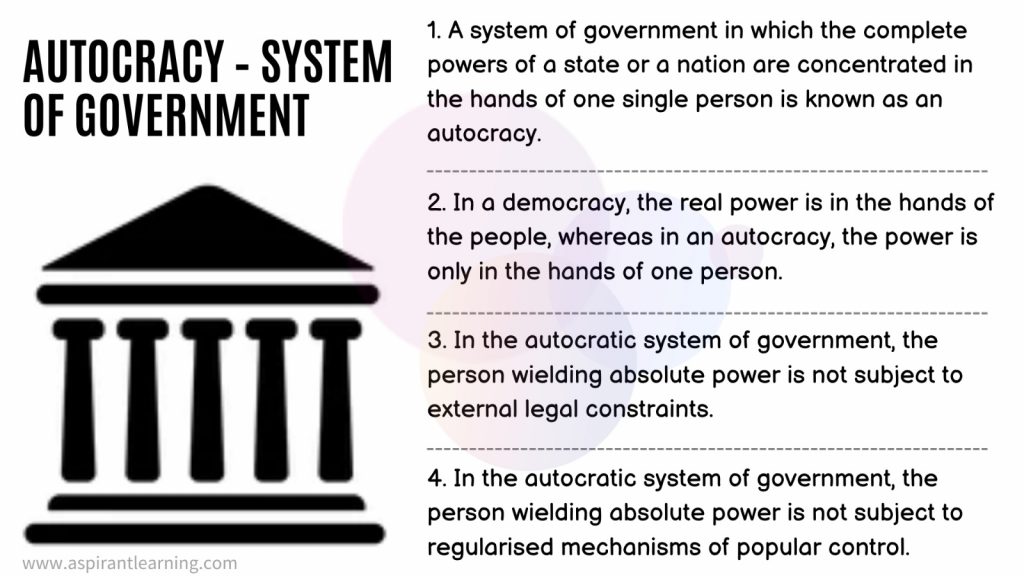News Highlight:
- According to the latest report from the V-Dem Institute at Sweden’s University of Gothenburg, the level of democracy enjoyed by the average global citizen in 2021 is down to 1989 levels, with the democratic gains of the post-Cold War period eroding rapidly in the last few years.
- The study, titled ‘Democracy Report 2022: Autocratisation Changing Nature?’ states that more than twice as many countries (32) are undergoing automatisation as are witnessing democratisation (15).

Key Takeaway:
- V-Dem (Varieties of Democracy) report classifies India as an autocracy (‘electoral autocracy’) rather than a democracy, ranking it 93rd on the liberal democracy index out of 179 countries.
- According to the report, India is one of the world’s top ten ‘autocracies’.
V-Dem report’s methodology:
- V-Dem uses aggregate expert judgments to produce estimates of critical concepts.
- It gathers data from over 3,700 country experts who provide judgments on different concepts and cases.
- V-Dem’s measurement model algorithmically estimates the reliability of an expert relative to other experts.
Parameters used to assess the status of a democracy:
- Classification of countries:
- The V-Dem report classifies countries into four regime types based on their score in the Liberal Democratic Index (LDI):
- Liberal Democracy,
- Electoral Democracy,
- Electoral Autocracy, and
- Closed Autocracy.
- The V-Dem report classifies countries into four regime types based on their score in the Liberal Democratic Index (LDI):
- Liberal Democratic Index (LDI):
- The LDI captures both liberal and electoral aspects of a democracy based on 71 indicators that comprise the Liberal Component Index (LCI) and the Electoral Democracy Index (EDI).
- The LCI measures aspects such as the protection of individual liberties and legislative constraints on the executive.
- At the same time, the EDI considers indicators that guarantee free and fair elections, such as freedom of expression and association.
- The LDI also uses an Egalitarian Component Index (to what extent different social groups are equal), Participatory Component Index (health of citizen groups and civil society organisations), and Deliberative Component Index (whether political decisions are taken through public reasoning focused on common good or through emotional appeals, solidarity attachments, coercion).
Key Findings of the Report:
- Top Performer in LDI index:
- Sweden topped the LDI index.
- Other Scandinavian countries, such as Denmark, Norway, Costa Rica, and New Zealand, make up the top five in liberal democracy rankings.
- India and South Asia:
- The report notes that India is part of a broader global trend of an anti-plural political party driving a country’s autocratisation.
- India ranked 93rd in the LDI.
- It figures in the “bottom 50%” of countries.
- It has slipped further down in the Electoral Democracy Index to 100, and even lower in the Deliberative Component Index, at 102.
- In South Asia, India is ranked below Sri Lanka (88), Nepal (71), and Bhutan (65) and above Pakistan (117) in the LDI.
- Rate of spread of autocratisation:
- Autocratisation is spreading rapidly, with a record of 33 countries autocratising.
- The report states a sharp break from an average of 1.2 coups per year in 2021 saw a record 6 coups, resulting in 4 new autocracies: Chad, Guinea, Mali and Myanmar.
- The number of liberal democracies stood at 42 in 2012.
- The number of liberal democracies has shrunk to its lowest level in over 25 years, with just 34 countries and 13% of the world population living in liberal democracies.
- Closed autocracies, or dictatorships, rose from 25 to 30 between 2020 and 2021.
- Increase in Electoral autocracy:
- The world has 89 democracies and 90 autocracies.
- Electoral autocracy remains the most common regime type, accounting for 60 countries and 44% of the world population or 3.4 billion people.
- Electoral democracies were the second most common regime, accounting for 55 countries and 16% of the world population.
Key suggestions:
- The intensifying wave of autocratization around the world highlights the need for new initiatives to defend democracy.
- In 2021, a series of such engagements originated from the highest levels as well as a multitude of important grassroots actions around the world.
- But engagement to protect and promote democracy must build on science to be effective.
- Facts must meet misconceptions and lie about the virtues and limitations of democratic and autocratic governance.
Pic Courtesy: Freepik
Content Source: The Hindu



